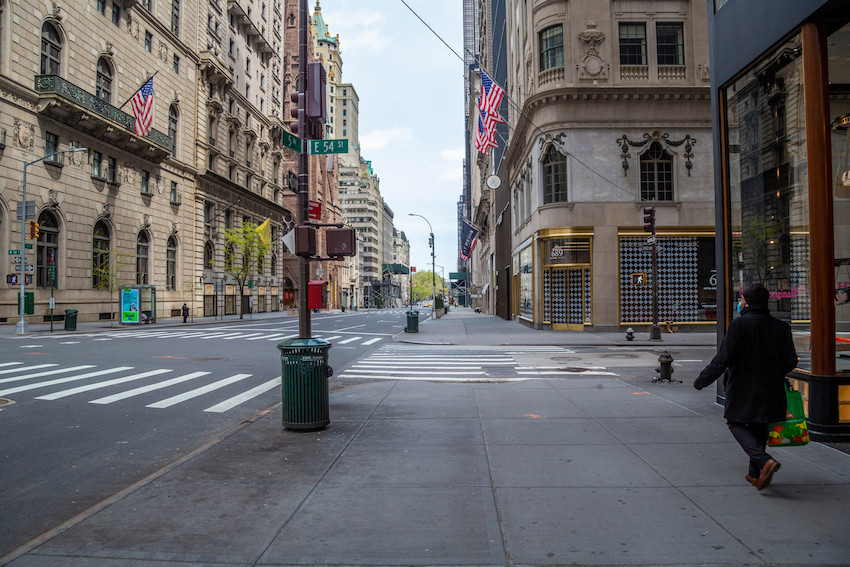US economy shrinks at fastest pace since 2008
The coronavirus outbreak and lockdown pushed first quarter US GDP down by an annualised rate of 4.8%. It was the deepest contraction since the financial crisis in 2008 and first drop since 2014. Economists expect a much sharper contraction in the second quarter. Sources: BBC, CityAM, CNN, Financial Times, The Guardian and NPR.
EU economic sentiment drops
European business and consumer confidence cratered in April to its lowest level since the European Commission’s index was created in 1985. Sources: Brussels Times, Financial Times and Reuters.
Norway to cut oil production
In an unofficial alliance with the Opec oil producers club, and facing slumping global demand, Norway will greatly reduce its oil output through the end of the year. It is the first time the country has slowed production since 2002. Sources: Bloomberg, Financial Times and Reuters.
Gilead drug shows “positive effect”
There is “clear cut” evidence that remdesivir speeds the recovery of covid-19 patients in early US trials, according to a senior White House scientific advisor. However, the study has not yet been peer reviewed. A separate Chinese study found the drug was not effective. Sources: BBC, Financial Times, The Guardian, Marketwatch, NPR and Reuters.
Technology earnings: Facebook
Advert sales dropped sharply in March, but Facebook’s revenue was 18% higher than the first quarter of 2019. Sources: CNBC, Financial Times, The Guardian and Reuters.
Technology earnings: Microsoft
Beating analyst expectations, Microsoft revenue grew by 15% in the latest quarter, much of that driven by its strong cloud computing business. Sources: CNBC, Financial Times, Marketwatch and Reuters.
Technology earnings: Tesla
Quarterly revenue soared by 30% compared to last year, allowing Tesla to post its third consecutive quarterly profit. Sources: BBC, CNBC, Financial Times and Marketwatch.
Boeing to cut 16,000 jobs
Boeing will slash its global workforce by 10% and greatly reduce its production of aircraft after losing $1.7bn in the first quarter, as the aviation market stalls. Sources: CNN, Financial Times, The Guardian and NPR.
EU starts legal case against Poland
The European Commission initiated a new legal procedure against Poland over Warsaw’s judicial system reforms. Sources: Deutsche Welle, Euractiv, Financial Times and Reuters.
EU and UK clash over Northern Ireland office
The European Commission will press the UK government over the EU’s plan to open a “technical office” in Belfast, to monitor future customs arrangements, which Britain has rejected. Sources: Financial Times, The Guardian, Irish Times and The New European.
Berlin airport given OK after 9 year delay
The new Berlin-Brandenburg airport has received approval to open on 31 October. It was originally scheduled to start operating in 2011. Sources: BBC, DPA and New York Times.
Billionaires net worth up
The Institute for Policy Studies found the wealth of America’s billionaires increased by 10% during the first three weeks of the covid-19 crisis. The net worth of Jeff Bezos, founder and CEO of Amazon, rose $10bn and Elon Musk, the founder of SpaceX and Tesla, was $5bn richer. Sources: CNN, GQ and The Register.
Rich Asian families trying to conserve cash
The fortunes of Asia’s wealthiest families are under pressure, per Bloomberg.
Agenda
Thursday 30 April, 11am-11:45am: Luxembourg Microfinance and Development Fund hosts a talk on the impact of covid-19 in central Asia. Thursday 30 April, 1:30pm-2:30pm: Paperjam Club’s “Manage a company remotely in compliance with Luxembourg law” legal training webinar. Thursday 30 April, 1:30pm-2:30pm: “Useful information” webinar for anyone planning to relocate to Luxembourg, organised by Luxrelo and the Indian Business Chamber of Luxembourg. Thursday 30 April, 3pm-4:10pm: Several technology vendors host a “secure remote working” webinar. Saturday 2 May, 4pm-5pm: Free interactive “Peppa Pig” workshop for children aged 3 and up. Sunday 3 May, 7pm: Online edition of the monthly “3 du Trois” dance performances. Monday 4 May, 5pm-6pm: “Writing effective emails to customers and contacts” webinar for learners of business English. Wednesday 6 May, 7pm-9pm: Virtual edition of the British Ladies Club’s monthly cocktail.
Here are 10 science & technology stories you may have missed
Astronomy: The Hubble Space Telescope has turned 30, but Nasa reckons it will still deliver some “surprises” over the next 5 years, per Scientific American. Biology: Researchers have grown glowing green plants by inserting mushroom genes into tobacco, per The Guardian. Cloud computing: Despite the covid-19 crisis, Amazon Web Services opened its 6th European hub, in Milan, per Data Economy and The Register. Electronics: Researchers are developing “low-power spin control” technology that could boost computing power by moderating electric fields instead of shrinking microchips, per Nature. Fauna: You probably won’t be surprised to read that chimpanzees and dolphins are among the planet’s smartest animals, per Popular Science, but goats and octopuses are too. Flora: Volunteers have found 10 apple varieties thought to be extinct in the US Pacific northwest region, per Associated Press. Health: Hong Kong researchers developed an anti-bacterial and anti-viral spray-on coating that should protect surfaces for 90 days, per Reuters. Medicine: Among the possible treatments for covid-19 being investigated in New York is an over-the-counter heartburn medication, per Science magazine. Physics: A professor explains how to make a floating table out of Legos via Wired. Space: CNet has a guide on how to spot a Starlink satellite train in the sky; a computer programmer known as cmdr2 launched the “Find Starlink” website where you can find the best local viewing times.
Covid-19 forces Oscars rule exception
With cinemas currently closed, the Academy Awards will for the first time consider films released just via streaming. Only movies which had a planned theatrical release upset by the virus lockdown will qualify for the exemption. Sources: BBC, The Guardian and Los Angeles Times.
Today’s breakfast briefing was written by Aaron Grunwald
